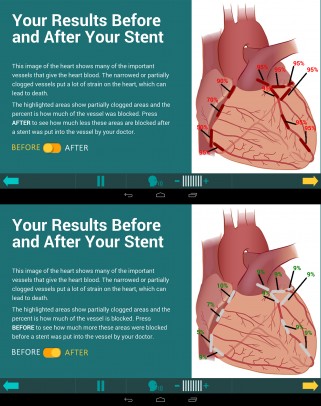App improves medication adherence for heart stent patients
A tablet computer application helped heart patients with drug-eluting stents take their medications correctly, a study has found.
The software, called MyIDEA (for “My Interventional Drug-Eluting Stent Education App”) was developed by researchers at the University of Illinois at Chicago who study data-simplification as a way to improve clinical outcomes.
Andrew Boyd, assistant professor of biomedical and health information sciences in the UIC College of Applied Health Sciences, says the app uses a patient-centered narrative to help patients understand the importance of taking their medication.
For patients with a drug-eluting stent, non-adherence to their medication regimen leads to a nine-fold greater risk of death within the first year of stent placement — and an ongoing increase in mortality of 20 percent to 40 percent.
“Non-adherence is often due to miscommunication between medical staff and patients regarding the purpose of the medication or the specific duration of the medication,” Boyd said. “We aimed to address this gap by creating a patient-centered education application.”

Screengrab of demo “before” and “after” heart health information from a tablet application —Images provided by: Andrew Boyd, assistant professor of biomedical and health information sciences in the UIC College of Applied Health Sciences
The app, he said, is tailored to patients by incorporating their own health information, from symptoms and treatment to care team information.
“MyIDEA then prompts the patient to respond to how their symptoms have affected their lives, ensuring reflective observation,” Boyd said.
The pilot study used a randomized trial to measure change in medication adherence. Twenty-four patients were recruited, and 13 received the intervention.
Researchers found that patients in the intervention group had a 10 percent higher medication possession ratio, or MPR, a common measure of medication adherence, than patients in the control group. On average, patients spent 21 minutes using MyIDEA.
Results are published in Frontiers in Public Health.
“Results from this study are promising and will enable new and effective education programs to increase patient knowledge about their health and treatment,” Boyd said.
“We observed that people spent a larger percentage of time on patient stories, focusing on problem-solving issues and critically thinking about solutions. This kind of patient-centered health information, used with an education application, is proving to be useful and progressive toward increasing drug adherence for patients.”
Co-authors on the study include Vicki Shah, Anandu Dileep, Carolyn Dickens, Vicki Groo, Betty Welland, Jerry Field, Matthew Baumann, Jose Flores, Dr. Adhir Shroff, Zhongsheng Zhao and Diana Wilkie of UIC; and Yingwei Yao of the University of Florida.
This project was supported by Grant No. P30AG022849 from the National Institute on Aging, Grant No. UL1 TR000050 from the National Center for Advancing Translation Sciences, and Grant No. P30 NR010680 from the National Institute of Nursing Research.
